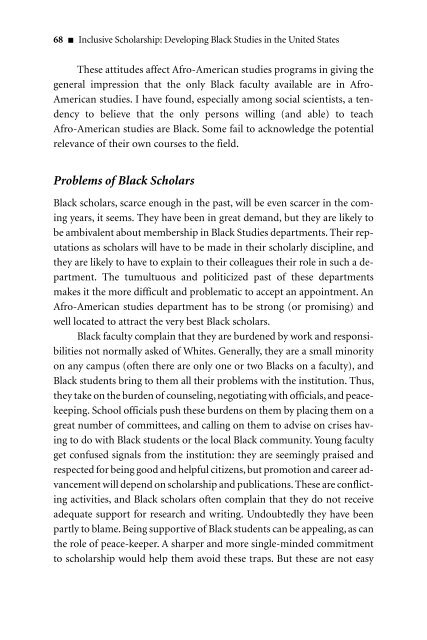Inclusive Scholarship: Developing Black Studies - Ford Foundation
Inclusive Scholarship: Developing Black Studies - Ford Foundation
Inclusive Scholarship: Developing Black Studies - Ford Foundation
You also want an ePaper? Increase the reach of your titles
YUMPU automatically turns print PDFs into web optimized ePapers that Google loves.
68 <strong>Inclusive</strong> <strong>Scholarship</strong>: <strong>Developing</strong> <strong>Black</strong> <strong>Studies</strong> in the United States<br />
These attitudes affect Afro-American studies programs in giving the<br />
general impression that the only <strong>Black</strong> faculty available are in Afro-<br />
American studies. I have found, especially among social scientists, a tendency<br />
to believe that the only persons willing (and able) to teach<br />
Afro-American studies are <strong>Black</strong>. Some fail to acknowledge the potential<br />
relevance of their own courses to the field.<br />
Problems of <strong>Black</strong> Scholars<br />
<strong>Black</strong> scholars, scarce enough in the past, will be even scarcer in the coming<br />
years, it seems. They have been in great demand, but they are likely to<br />
be ambivalent about membership in <strong>Black</strong> <strong>Studies</strong> departments. Their reputations<br />
as scholars will have to be made in their scholarly discipline, and<br />
they are likely to have to explain to their colleagues their role in such a department.<br />
The tumultuous and politicized past of these departments<br />
makes it the more difficult and problematic to accept an appointment. An<br />
Afro-American studies department has to be strong (or promising) and<br />
well located to attract the very best <strong>Black</strong> scholars.<br />
<strong>Black</strong> faculty complain that they are burdened by work and responsibilities<br />
not normally asked of Whites. Generally, they are a small minority<br />
on any campus (often there are only one or two <strong>Black</strong>s on a faculty), and<br />
<strong>Black</strong> students bring to them all their problems with the institution. Thus,<br />
they take on the burden of counseling, negotiating with officials, and peacekeeping.<br />
School officials push these burdens on them by placing them on a<br />
great number of committees, and calling on them to advise on crises having<br />
to do with <strong>Black</strong> students or the local <strong>Black</strong> community. Young faculty<br />
get confused signals from the institution: they are seemingly praised and<br />
respected for being good and helpful citizens, but promotion and career advancement<br />
will depend on scholarship and publications. These are conflicting<br />
activities, and <strong>Black</strong> scholars often complain that they do not receive<br />
adequate support for research and writing. Undoubtedly they have been<br />
partly to blame. Being supportive of <strong>Black</strong> students can be appealing, as can<br />
the role of peace-keeper. A sharper and more single-minded commitment<br />
to scholarship would help them avoid these traps. But these are not easy

















